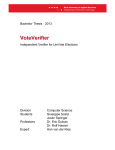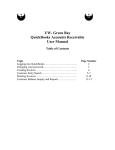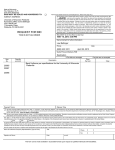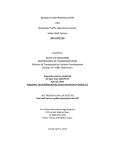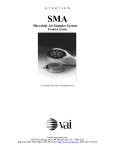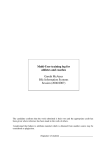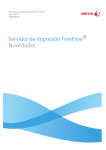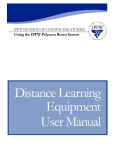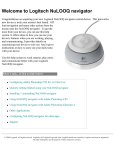Download What is a Purchasing Card - University of Wisconsin
Transcript
PURCHASING CARD USER MANUAL TABLE OF CONTENTS TOPIC PAGE NAME OF FORM PAGE 1. Sales & Use Tax Certificate of Exempt Status…………………………... 2. Card Member Services Corporate Dispute Form……………………... 3. Purchasing Card Application &Use Agreement………………………. 4. Purchasing Card Log……………………………………………………….. 5. Purchasing Card Missing Receipt Form…………………………………. 6. How to View Transactions in WISDM……………………………………… 7. Frequently Asked Questions………………………………………………... 8. Frequently Questioned Transactions……………………………………… 13 14 15 16 17 18 - 23 24 - 25 26 - 29 1. What is a Purchasing Card?................................................................... 2. Definitions……………………………………………………………………… 3. What are the Benefits of a Purchasing Card?..................................... 4. Who are Likely Cardholders?................................................................. 5. How do I Obtain a Purchasing Card?.................................................. 6. Personal Liability, Your Credit Rating & Misuse………………………… 7. Guidelines for Card Use……………………………………………………. 8. Merchant Category Code Standards……………………………………. 9. Use of Purchasing Card with Statewide Contracts……………………. 10. Cardholder Responsibilities…………………………………………………. 11. Supervisor Responsibilities…………………………………………………… 12. General Instructions for Card Use…………………………………………. 13. What Qualifies as Source Documentation?.......................................... 14. Reconciliation Procedure…………………………………………………... 15. Returns, Credits or Disputed Items………………………………………… 16. Who has the Signatory Authority to Sign Agreements & Contracts?. 17. Credit Card Security…………………………………………………………. 18. Reporting Lost or Stolen Cards…………………………………………….. 19. Card Renewal………………………………………………………………… 20. Changing Card/Account Information…………………………………… 21. How to Cancel a Card……………………………………………………… 22. Post Audits……………………………………………………………….. 23. Consequences of Failure to Comply with Policy Guidelines………… 24. Key Contacts………………………………………………………………….. 2 2 3 3 3 4 4 5 5 5 5 6 8 9 9 10 10 11 11 11 11 12 12 12 FORMS 1 What is a Purchasing Card? The University of Wisconsin-Green Bay Purchasing Card Program is designed to expedite the purchasing process and reduce the costs associated with processing low-dollar (less than $5000), best judgment orders for official University business needs. Widespread merchant acceptance and flexible purchasing power in the hands of the buyer add convenience, efficiency and value to the purchasing process. The VISA Purchasing Card payment system is an individual bill/central payment system. You, the cardholder, receive a monthly account statement for information and reconciliation purposes only. An electronic billing file is sent centrally to the accounting system (Accounts Payable), together with a summary of all charges with supporting detail. Accounts Payable makes one payment to VISA on behalf of all cardholders. Expenditure transactions are processed through the agency’s accounting systems (PeopleSoft) and posted to the various departmental accounting code combinations. In brief, a Purchasing Card is: Authority delegated by the Purchasing Supervisor to individual university employees Authorized for official State use only Authorized for individual purchases less than $5000. Authorized for purchases greater than $5000 on statewide contracts where indicated and with prior approval from the Purchasing Office Authorized for use within certain categories of merchants and commodities A Purchasing Card is NOT: For cardholder personal use purchases or identification under any circumstances. It cannot be used for reimbursable meal costs or other miscellaneous lodging expenses such as phone calls A means to avoid appropriate procurement or payment procedures A card to access cash or credit (ATM) A travel card (Corporate Card must be used) A right of employment For interagency or intra-agency use (except for retail purchases) Definitions • • • • • • • Purchasing Card means a charge card issued to an authorized state employee through the campus purchasing card administrator, who is delegated the authority by the Department of Administration, State Bureau of Procurement, UW System Office of Procurement and the UW-Green Bay Purchasing Supervisor. Cardholder means a specific state employee who has been issued a purchasing card. Purchasing Card Administrator means the individual appointed to manage, coordinate and control purchasing cards within the agency. Supervisor means the person responsible for approving the cardholder’s time and leave reporting. Original Receipt means the customer copy of the purchasing card receipt signed by the cardholder at the time of purchase. In the case of phone, fax or Internet orders, “original receipt” means the copy of the receipt sent by the supplying vendor to the purchaser with an itemized list of the goods purchased. Statement means the detailed bank statement that is sent to the cardholder by the purchasing card vendor (U.S. Bank). Billing File means the detailed bi-weekly billing that is received electronically by UW-Green Bay Accounts Payable. 2 • • • • MCC means the merchant category code assigned by the banking industry which designates the type of vendor business TER means Travel Expense Report DOA means Department of Administration UW-System means University of Wisconsin-System What are the Benefits of a Purchasing Card? The Purchasing Card enables cardholders, purchasing and accounting staff to perform more effectively and focus on the value-added aspects of your jobs by: Reducing time needed to purchase and receive supplies Reducing the number of purchase orders Reducing reimbursements from petty cash Reducing the number of invoices and invoicing problems Reducing the number of checks issued Who are Likely Cardholders? Anyone on the UW-Green Bay payroll system that has been approved by the head of their Department can be a cardholder. Because the Purchasing Card allows the cardholder to place orders directly with the supplier, the greatest program benefits are achieved when cards are issued to end-users. Other staff that would benefit by using a purchasing card includes (but is not limited to): Field staff, who may need emergency parts or supplies Librarians/others who routinely buy subscriptions and books Program support staff who buy supplies Facilities Management/Maintenance staff How Do I Obtain a Purchasing Card? 1. Read and complete the Purchasing Card Application & Use Agreement Form located at http://www.uwgb.edu/purchasing/purchasingCard/index.htm The Purchasing Card Application & Use Agreement Form must be signed by the cardholder and their supervisor. 2. The employee will receive one Purchasing Card associated with one departmental budget. Purchases on the card may be reallocated to other departmental budgets through use of on-line Transaction Management. Multiple cards with different budget numbers may be issued to one individual; however, those requests should be minimal. The card will be mailed directly to the cardholder within 5 business days after it is requested. You will be notified of the date the Purchasing Card(s) was/were requested. 3. Attend a 30-minute training session. Contact the Purchasing Card Administrator, Marie Helmke at X2598 to schedule a session. 4. Keep a copy of the Purchasing Card Application & Use Agreement. Forward the original, signed copy to the Purchasing Card Administrator. 3 Personal Liability, Your Credit Rating & Misuse The University of Wisconsin-Green Bay assumes full liability for the payment and campuswide use of the Purchasing Card, therefore, a cardholder’s personal credit rating will not be affected by use of the Purchasing Card. However, all users are required to sign an agreement prior to receiving the card acknowledging attendance at a training session and their intent to use the card in compliance with the program requirements. The penalty for misuse of these cards is the same as any order which misuses State funds, which can be up to, but not limited to, dismissal. If misuse of the Card occurs, any personal or unauthorized item(s) must be immediately returned to the vendor for full credit OR the employee must repay the campus all personal amounts including any applicable state, county or city sales taxes. Even if the vendor does not charge these taxes, the campus must collect and remit the taxes to the State of Wisconsin Department of Revenue. All documents related to the Purchasing Card may be fully disclosed as a public record to the extent provided by the Open Records Law and Open Book Wisconsin (http://openbook.wi.gov/ ). The US Bank/VISA Purchasing Card Program provides liability protection to the State once notification of any loss, theft or fraudulent use is made. However, the same level of liability protection does not apply to cards that have been shared by multiple users. It is imperative the Purchasing Card be used only by the person whose name appears on the Card. If the card is deliberately given by the cardholder to another person who uses it inappropriately, the cardholder is responsible for reimbursement from personal funds for all charges and loss of the privilege to retain the card. Guidelines for Card Use The Purchasing Card is to be used to purchase low-dollar value items with the total amount of any purchase not to exceed $5000. These items may include: -subscriptions for business use sent to the University address -membership fees/dues -conference registrations/NOTE: it must state on the Travel Expense Report that the purchasing card was used for the registration fee. A copy of the conference brochure must be attached to the TER or it will be returned. Examples of items that may not be purchased with the card: Academic Support Service Agreements (ASSA) Advertising (Classified) Alarm/security systems Alcoholic beverages, drugs or pharmaceuticals Ammunition Capital equipment or component parts Consulting Services Flowers/gifts/awards Gasoline/fuel Insurance Leases/rentals Legal Services Meals/entertainment Motor Vehicles Printing Radioactive Materials Temporary help Travel (hotel/motel) The Purchasing Card may not be used for cash advances (ATM machines) or to purchase non-business (personal) items/services. 4 Merchant Category Code Standards Vendors are assigned a Merchant Category Code (MCC) by their bank, which designates the type of business they conduct (ex. hardware store, liquor store, etc.). All Purchasing Cards are encoded with specific MCC exclusions (ex. tattoo parlor). Attempting to buy from these merchants will cause your transaction to be denied. Occasionally, a bank may have wrongly assigned a vendor’s MCC. If you run into a situation where your transaction is rejected for an appropriate purchase, contact the Purchasing Card Administrator at X2598. Use of Purchasing Card with Statewide Contracts The Purchasing Card may be used on statewide contracts ONLY when the contract or subsequent amendment indicates that card use is allowed. The procedures for use on contracts are subject to change at any time. Contact the Purchasing Card Administrator if you are aware of a contract vendor who accepts credit cards and the contract documentation indicates card use is disallowed. Be sure to consult the relevant contract before making any purchase with the card. Cardholder Responsibilities Agrees that the card will be used only by the person whose name appears on the card. Before a University employee can be issued a purchasing card, he/she will: 1. Attend training by the Purchasing Card Administrator 2. Read and sign the User Agreement Form acknowledging his/her understanding of the restrictions on the use of the card and possible actions if he/she violates the conditions of DOA and UW-System policies on use of the card. Order necessary supplies and services in accordance with the UW-Green Bay Purchasing Policies & Procedures. Ensure appropriate receipt of materials and services and follow-up with vendor to resolve any discrepancies. Maintain all receipts, invoices, packing slips, order confirmation screens, etc (see source documentation qualifications listed below). Reconcile source documentation with the transactions listed on the bi-weekly bank statement. If there are discrepancies, note them on the statement and take the appropriate steps to resolve them. Attach documentation to the back of the bank statement it pertains to; apply cardholder signature to attest that all purchases are for official University business and comply with appropriate rules and regulations. Forward to the supervisor/reviewer for their review and signature. Be prepared to respond to audits in which card activity and documentation is reviewed by the Purchasing Card Administrator and DOA. Supervisor Responsibilities Review information submitted by the cardholder. The supervisor should compare receipts to the bank statement submitted by the Cardholder no less than quarterly (at a bare minimum). Sign and date bank statement to acknowledge review. Verify purchases are for University business. Apply signature to bank statement to certify the purchases are for University business purposes and comply with appropriate rules and regulations. If it is determined that personal or other unauthorized charges are occurring on 5 the card, then appropriate steps, up to and including dismissal, will be taken to resolve the misuse/abuse of the card. The supervisor is responsible for notifying the Purchasing Card Administrator of accounts that must be closed due to departure of the cardholder. General Instructions for Card Use 1. If the transaction value is greater than your assigned value (single transaction limit), either use traditional purchasing procedures (enter a purchase order for purchases $5,000 or more or process a direct charge for lesser amounts) or contact the Purchasing Card Administrator at X2598 to request a temporary increase on your card limits. 2. If the transaction value is assigned value or less: Assuming the item is not on a mandatory state contract you may use best judgment (under $5,000) to determine an appropriate vendor for the materials desired. You are encouraged to obtain a minimum of three quotes. These quotes should be attached to the purchase receipt from the low bidder. Orders exceeding $5000 must be bid by the Purchasing Office. Consult VendorNet for mandatory contract vendors; view online on the Purchasing website. The State of Wisconsin and UW-Green Bay are committed to the involvement of minority business enterprises in the state’s procurement program by attempting to ensure that a minimum of 5% of the total dollars spent in a fiscal year, are paid to minority businesses. Check the Purchasing website Purchasing website for a listing of the approved minority vendors. Approved minority vendors are given a 5% award of preference (if their bid is within 5% of the lowest bid obtained, the order should be given to the minority vendor.) There is a listing of vendors that are not eligible to conduct business with the State/University. Vendors doing business with State agencies are declared ineligible if they do not comply with the Wisconsin Sales and Use Tax OR if they do not submit acceptable affirmative action information. According to Wisconsin law, state agencies, the University of Wisconsin and their employees are prohibited from making purchases from these vendors. • Vendors and their affiliates who are not properly registered and remitting Wisconsin sales or use tax will be declared ineligible under s.16.75 10m) and 77.66, Wis. Stats. These vendors are listed at: http://vendornet.state.wi.us/vendornet/wocc/certlist.pdf • Vendors who fail to submit acceptable affirmative action information are also ineligible. A vendor remains ineligible until s.16.765, Wis. Stat and ADM 50, Wisconsin Administrative Code information is submitted. These vendors are listed at: http://vendornet.state.wi.us/vendornet/wocc/wocc.asp Give the vendor your Purchasing Card number and expiration date or present the card at the point of sale. If your transaction is declined, contact Customer Service at the 800-number on the back of your card. You may also contact the Purchasing Card Administrator at X2598 to determine the reason. Reasons a Card may be declined include: -exceeding the single/bi-weekly transaction limit established for your Card.* -vendors Merchant Category Code (MCC) is incorrect and therefore 6 transaction is restricted. -vendor enters incorrect expiration date when processing authorization. -vendor’s equipment is not working properly. *If you feel the established single/bi-weekly limits are not appropriate, contact or email Marie Helmke requesting a revision, along with justification for the request and approved by your supervisor. A response approving or denying the request will follow. Raising credit limits is preferred as opposed to the vendor “splitting” charges in order to remain under the established credit limits. Tell the vendor that the State is exempt from State sales tax. NOTE: Tax exempt number is ES 40706. A copy of the Sales & Use Tax Certificate of Exempt Status is located in the back of this booklet, as well as on the Purchasing website. The certificate may be photocopied as needed. If the material will be shipped or delivered, instruct the vendor to enclose or mail a copy of the receipt/invoice with the shipment. Emphasize to the vendor that the receipt must be mailed to the cardholder and not Accounts Payable or the Purchasing Office. Ask the vendor to mark it “paid” to avoid duplicate payments. To assure timely delivery, ask the vendor to address the shipment as follows: Cardholders Name and Dept. Name/Mail Stop UW-Green Bay Receiving Dept. /CHARGE or P-CARD 2420 Nicolet Dr. Green Bay, WI 54311 Also, ask the vendor to put the following word (or something to its effect—ex. Purchasing Card, Charge, etc.) on the shipping label where there would normally be a purchase order number. This will notify Central Receiving personnel that the shipment is related to a Purchasing Card transaction and delivery will be made much quicker. If the material is picked up, be sure to obtain the itemized receipt indicating the purchase price. Ensure the merchant specifically identifies what is purchased and does not use a description such as “miscellaneous merchandise”. The business purpose of the purchase must be documented on the Purchasing Card receipt or the bank statement. Purchases in Person: Must have a signed, detailed receipt at the time of purchase clearly identifying each item purchased. Phone/Fax Orders: The original invoice or packing slip sent with goods shipped. If the packing slip doesn’t have the itemized detail, write it on by hand. Internet Orders: Print a copy of the order or confirmation screen that shows what was purchased and the dollar amount. Use extreme care when sending Card numbers over the Internet. Make sure the website has some type of security alert box OR a secure site statement along the bottom of the order page before submitting the final order. 3. Maintain a Purchasing Card receipt file: Obtain and file receipts for all transactions for reconciliation purposes. 7 What qualifies as source documentation? The original supporting documentation must be retained in the Purchasing cardholder’s file, attached to the bank statement it pertains to. A bank statement is generated on a bi-weekly basis and mailed to the cardholder if transactions occurred in the billing period. Supplies/Services Documentation Requirements Standard Documentation: Itemized invoice (required) Packing Slip (optional) Order/confirmation screen (required) Cash register receipt (required) Registration form (required) Missing receipt form (required when no other document is available) Phone/Fax Orders Attach the enclosed invoice when the merchandise is received. The packing slip often times does not have the price of the item included; therefore, it does not meet the requirements of supporting documentation for this program. Internet Orders Print and attach a copy of the order and/or confirmation screen. The confirmation screen, if available, is preferred over the order screen. Point of Sale/Pick-Up Orders Attach the cash register receipt and/or invoice. If the itemized detail is not on the receipt, write it in by hand. Recurring Monthly Charges without Invoices Attach the original contract or service agreement to the bank statement that reflects the first monthly service fees. A memo justifying the need for the service should also be attached. Each month thereafter, the recurring fee should be noted as such, since there may not be a monthly receipt or additional documentation to attach. Subscriptions & Memberships The subscription or membership may be sent via email or regular mail to the University address. The subscription, membership or registration for the same department cannot be paid twice in one fiscal year. Registrations Attach a copy of the registration form. Make a second copy of the form to attach to the traveler’s TER. The registration is noted in the Direct Billed Expense column of the TER. Missing Receipt Form If unable to obtain any type of documentation at all, complete the Missing Receipt Form located at http://www.uwgb.edu/purchasing/purchasingCard/index.htm It is intended for occasional use only. 8 4. Transaction Management/Reallocation of Charges (Optional) Transaction Management is available for those cardholders that wish to reallocate charges to other departmental budgets than the one associated with the Purchasing Card. It also allows access to view bank statements online and the ability to print them. Use of Transaction Management eliminates the need to process a chargeback. Contact the Purchasing Card Administrator for further information. Reconciliation Procedure 1. A bank statement for each account is mailed to you, the cardholder. An electronic billing file is sent to Accounts Payable for payment processing. 2. It is your responsibility as the cardholder to verify the charges on the statement against all receipts. Attach receipts to the corresponding statement. If there are inaccuracies and/or erroneous charges, complete the Card Member Services Corporate Disputes Form (located in back of the manual and online). This form gets faxed directly to U. S. Bank with a copy to the Purchasing Card Administrator. 3. Sign by “Cardholder Signature” on the card statement to document review and submit it to your supervisor for their review on a no less than quarterly basis. The supervisor must also sign the Card statement verifying the charges were appropriate and for University business purposes. 4. The cardholder is responsible to ensure that the bank statement reconciliation is performed, the bank statement is signed by the cardholder and their supervisor and that the bank statement along with the original receipts and recorded business purpose of the transactions is forwarded to the Purchasing Office within two weeks of receipt of the bank statement. The Purchasing Office will maintain a file of bank statements for all of the cardholders with attached documentation in a secure location for a period of seven (7) fiscal years (6 plus the current). After this time, the documents can legally be destroyed following the official procedures for confidential destruction. Returns, Credits or Disputed Items The cardholder is responsible for following up with the merchant or bank on any erroneous charges, disputed items or returns as soon as possible. Disputed billings can result from failure to receive the goods charged, defective merchandise, incorrect dollar amounts, duplicate charges, credit not processed, as well as fraud and misuse. If you have a problem with a purchased item or a billing resulting from use of the Purchasing Card, you should first try to reach a resolution with the supplier that provided the item. In most cases, disputes can be resolved directly between the cardholder and the supplier. All errors, disputes, returns, fraud and pending credits should be noted on the source documentation. Credits Referring to your receipt, request from the merchant that a credit be placed on your card account. If the item was shipped, refer to the shipping form you kept with your Card Statement. 9 Returns A credit should be issued for any item that the supplier has approved for return. The credit should appear on a subsequent statement. Any item purchased with the Purchasing Card that is returned must be returned for credit. Do not accept a refund in cash/check format or as an in-store credit. Make sure you keep documentation of credits, returns and exchanges with your Card Statement. Disputed Items If you are disputing a charge and cannot reach resolution with the supplier, complete the Card member Services Corporate Disputes Form (copy located at the back of this manual and online) and fax to U. S. Bank Financial Services along with a copy to the Purchasing Card Administrator (fax #465-5649). The written notice of dispute must be received within 60 days of the date the transaction occurred. Who Has The Signatory Authority to Sign Agreements & Contracts? The Contracting Officer has signatory authority for procurement agreements and contracts, however, individual cardholders are considered to have delegated authority to sign certain confirmation documents when less than $5000 (ex. coach bus confirmation). Documents that require signatures to confirm arrangements are permitted to be signed by individual cardholders when the department confirms a simple transaction committing the University to pay a specific sum in return for specific, clearly defined product/services. Such documents cannot: • Exceed the cardholder’s single transaction limit • Exceed one year in duration • Have any automatic renewal language • Have penalty clauses for termination • Require the University to “waive” any rights • Contain any “limits of liability clauses” • Contain any “hold harmless”, “indemnification” or “arbitration” clauses Credit Card Security Your Purchasing Card should be treated with the same level of care you use with your personal credit cards. The card should not be loaned to another person. The only person authorized to use the Purchasing Card is the person whose name is on the front of the card or who completed the Purchasing Card Application/Use Agreement. Your Purchasing Card account number should be guarded carefully. Do not post it or write it in any location that is accessible to others. Use extreme care when sending your Card number over the Internet; be sure you are using a safe, secure and trusted site. Accounts that are unused for a period of six (6) months or more will be closed as they pose a financial risk to the State in terms of fraud and misuse. 10 Reporting Lost or Stolen Cards Unlike personal credit cards where cardholders are responsible for paying the first $50.00 if the card is stolen or misused, US Bank will hold the University (and ultimately, your department) responsible for paying all charges resulting from stolen or misused cards until they have been notified. Contact US Bank immediately at (800) 344-5696 to report a lost/stolen card. This number is available 24 hours/7 days a week. At the first available opportunity, report the same information to the Purchasing Card Administrator at X2598. Card Renewal Your card will be automatically renewed and mailed to your campus address at the end of the month preceding the expiration date embossed on the current card. Changing Card/Account Information All changes to a cardholder account must be submitted to the Purchasing Card Administrator at [email protected] Requests for permanent changes to the single or bi-weekly limits require documentation of the supervisor’s approval. How to Cancel a Card When a cardholder leaves the department, cancellation of the card is to take place on or immediately following the cardholder’s last day of employment. Timely cancellation of the card is an integral part of maintaining the integrity of the program. If all items on the card have been received prior to the cardholder’s departure date, the cardholder is to cut up the card and turn it into their supervisor to begin the cancellation process. The supervisor is responsible for notifying the Purchasing Card Administrator of account cancellation. If ordered items remain outstanding or backordered, the cardholder is to cut up the card and turn it over to their supervisor. Once the outstanding orders have posted to the account, the supervisor is responsible for canceling the account with the Purchasing Card Administrator. Under no circumstances should the department continue to use the card to order supplies and services after the cardholder’s departure date. Departments must acknowledge the fact that the cardholder is ultimately responsible for all orders placed on the card and continued use of the card after the cardholder’s departure date should not be requested or expected. Whenever possible, complete the Purchasing Card Application & Use Agreement Form to obtain a card for a new employee or interim replacement cardholder prior to the current cardholder’s departure date. A card cannot be transferred from one individual to another. If you leave the University or transfer to another department within the University, you must return your Purchasing Card to the Purchasing Card Administrator who will cancel the card. Returned Purchasing Cards are not reissued to other employees for use. Before returning a canceled Purchasing Card, cut the card in half. 11 Note: If you have established accounts with vendors that have your Card number hardcoded into their system, please note that these will also need to be canceled and reestablished as a new account with your successor (ex. monthly cell phone billing). Post Audits The UW-Green Bay Purchasing Card Administrator as well as the State Bureau of Procurement and the State Controller’s Office, will conduct random audits of Purchasing Card use. The primary purpose of these audits is to ensure the Purchasing Card program procedures are being followed and that: Purchase volume appears reasonable Use of mandatory contract vendors is being complied with Transactions appear to be appropriate purchases from State funds The card is being used for appropriate & legal (not personal) transactions Documentation is complete (receipts attached, business purpose of transaction documented, reconciliation taking place, etc) Consequences of Failure to Comply with Policy Guidelines Any misuse of the card or other failure to comply with these procedures will result in the following cardholder consequences: Revocation of Card Disciplinary measures, if appropriate In addition, if the misuse involves personal transactions, the cardholder must repay to the University all personal amounts, including any applicable state, county or city taxes. “Three strikes and you’re out” rule. Three separate instances of misuse will result in temporary or permanent termination from the program Key Contacts The following contacts are available to provide assistance, answer questions, or help solve any problems that arise: University Purchasing Card Administrator Marie Helmke, 920-465-2598 To apply for a Purchasing Card For questions about policies and procedures To replace damaged cards For assistance with suppliers For account inquiries For billing information If you didn’t receive your monthly statement To report a lost or stolen card To determine reason card transaction was denied US Bank Customer Service: (800) 344-5696 To report lost or stolen cards For questions about your statement 12 13 CARDMEMBER SERVICES Corporate Disputes P.O. Box 6335 Fargo, ND 58125-6335 Fax: 1-866-229-9625 (toll-free) 1-701-461-3463 Merchant Name: Dispute Amount: Post Date: Transaction Amount: I have examined the charges made to my account and I am disputing the above item for one of the following reasons: 1. 2. 3. The sales receipt amount was increased from $___________ to $____________. Neither did I authorize this charge nor did I participate in the transaction. Although I did participate in a transaction with the merchant, I was billed for ______transactions totaling $___________ that I did not engage in, nor did anyone authorized to use my card. I do have my credit card in my possession. Enclosed is a copy of my authorized sales slip. 4. I did participate in the transaction. However, I paid for the transaction using another form of payment. (Describe form of payment): ________________________________________________. Enclosed is a copy of my form of payment (i.e. canceled check, other credit card statement, cash receipt, etc.). 5. I did not receive $__________ from an ATM located at ___________________________________. 6. I have not received the merchandise which was to have been shipped to me. The expected delivery date was ___________ (MM/DD/YY). I contacted the merchant on _____________ (MM/DD/YY) and requested that my account be credited. I spoke with ____________________________(name). 7. Merchandise was shipped to me which arrived damaged and/or defective (circle one) on _________ (MM/DD/YY). I returned it on ______________(MM/DD/YY). I contacted the merchant on _______________ (MM/DD/YY) and requested that my account be credited. I spoke with _________________________(name). Enclosed is an explanation of how the merchandise was damaged or defective. 8. I notified the merchant on ____________(MM/DD/YY) at____ am/pm to cancel the pre-authorized order/reservation. Cancellation #____________________________________ (required). Reason for cancellation_____________________________________________________. Person I spoke to _________________________________________________________. 9. I have returned/canceled (circle one) the merchandise on ____________(MM/DD/YY) because _______________________________________________________________________________. Enclosed is documentation showing proof of return or cancellation. 10. The attached credit slip was listed as a charge on my statement. 11. ____ I was issued a credit slip for $_______on _________ (MM/DD/YY), which has not been posted to my account. I have enclosed a copy of my credit slip. 12. ____ The charge in question was a single transaction (sale #1), but was billed twice to my statement. I did not authorize the second transaction. Sale #1 $_______________ Ref. # __________________________________ Sale #2 $_______________ Ref. # __________________________________ 13. ____ I am not disputing this charge, however, I need a copy for my records. 14. ____ Other, please explain: ______________________________________________________________ ________________________________________________________________________________ ________________________________________________________________________________ ________________________________________________________________________________. Account #: ____________________________________________________________ Cardholder's Name: _____________________________________________________ Cardholder's Signature: ___________________________________________________ Date Signed: __________________________Daytime Phone #: ___________________ Cardmember Services, Corporate Dispute Department, P.O. Box 6344, Fargo, ND 58125-6344 14 PURCHASING CARD APPLICATION & USE AGREEMENT Print form, complete all fields and submit to the Purchasing Card Administrator, Purchasing Office Employee Cardholder’s Name (as shown on payroll) Department Campus Mailing Address Campus E-Mail Address Campus Phone Number Single Transaction Limit (Up to $5000) ACCOUNT FUND $ DEPARTMENT PROGRAM PROJECT/GRANT The Purchasing Card is intended for best judgment purchases (up to $5000). Purchases made with this card must comply with Department of Administration and University of Wisconsin procurement policies and procedures as stated in the State Procurement Manual, the State Accounting Manual and the UW-Green Bay Purchasing Card Manual. The Purchasing Card MAY NOT be used for cash advances (ATM machines) or to purchase non-business/personal items, and other items as specified in the Purchasing Card User Manual. If the card becomes lost or stolen, the cardholder must IMMEDIATELY NOTIFY U.S. Bank (800-344-5696) and the Purchasing Card Administrator (X2598). When a cardholder terminates employment with the University or transfers to another department, the department head or a designee must reclaim the Purchasing Card and return it to the Purchasing Card Administrator. Non-adherence to any of the above procedures may result in revocation of individual cardholder privileges and potential disciplinary action, and may result in revocation of all Purchasing Cards for that department. As an applicant/cardholder of a State of Wisconsin Purchasing Card, I understand the responsibility for the protection and proper use of this card as detailed above and in the guidelines outlined in the State Procurement Manual, the State Accounting Manual and the University of Wisconsin-Green Bay Purchasing Card User Manual. Transaction Management allows cardholders to reallocate charges to other departmental budgets than the one associated with the Purchasing Card. You can also access bank statements online. Please state whether you want an account set up for Transaction Management_________YES_________NO Applicant/Cardholder Signature Date Signed I approve the issuance of a State of Wisconsin Purchasing Card to the above-named employee and acknowledge the overall responsibility for the proper use of the card. Supervisor Signature Supervisor Name (Printed or Typed) Purchasing Card Administrator Signature Date Signed Date Signed I acknowledge receipt of the Purchasing Card: X_______________________________________________________________________________________________ Cardholder Signature Date Signed Note: Sign your card immediately upon receipt. 15 ACCOUNT NAME:____________________ STATE OF WISCONSIN DOA-3585 (C04/97) BUDGET NUMBER:___________________ UNIVERSITY OF WISCONSIN-GREEN BAY PURCHASING CARD RECORD Cardholder (Employee) Name Purchase Date For Reporting Period (mm / dd / yy) Vendor Page ____ of ____ Items Purchased Cost charges on this period’s statement Page Subtotal CARD TOTAL The above purchases on the State of Wisconsin Purchasing Card have been reviewed and reconciled. Receipts are attached in order of occurrence. This purchase record is available for audit review at any time upon request and will be kept in my departmental files for a total of five fiscal years. X Cardholder signature Date submitted 16 X Approved by (cardholder’s supervisor) Purchasing Card Missing Receipt Form (For internal use only, retain with the bank statement) This form is to be used as documentation only if the actual receipt, invoice or Internet confirmation screen print is unavailable for a transaction made on the Purchasing Card. It will be allowed only as a rare circumstance. It must be filled out COMPLETELY and signed by the Cardholder’s Supervisor. Supplier Name (required): Supplier Phone Number: Supplier’s City: Date order place (required): Placed by: QUANTITY UNIT PRICE DESCRIPTION TOTAL COST Order Total (required): The University is exempt from sales tax in most instances (Tax Exempt #ES40706) Why is the original receipt, invoice or other appropriate substitute missing? Cardholder Signature (required): Print Name: Supervisor’s Signature (required): Print Name: Date: Date: 17 HOW TO VIEW PURCHASING CARD TRANSACTIONS IN WISDM (OPTION 1) 1. After logging into WISDM, click on Main Menu, Departments, Search 2. Enter Fund and Department Code, Submit (Program number will be listed on drop-down menu on the next screen under Report Options if you want to look at a specific budget by program number) 18 3. Click on Drilldown Level, click on 3 4. Click on Expenses link for Supplies 5. To view the cardholder associated with a specific charge you must enable the Journal Line Reference column*: 19 • • • Click on Pick Custom Columns link in upper right corner of the screen Check “Journal Line Reference” located under Journals Click Update Click on Column Header “GL Jrnl ID” to sort by expense type. P-Card transactions appear with the suffix “PC”---you are able to view the vendor name, dollar amount and cardholder name. 20 *Activation will also show the MD account number used to place orders with MDS. HOW TO VIEW PURCHASING CARD TRANSACTIONS IN WISDM (OPTION 2) 1. After logging into WISDM, select Departments & Search from the Main Menu. 2. Enter the department funding code associated with the P-Card transaction; Submit 21 3. Change Drilldown Level to 6; 4. Click on the link under the Expenses column corresponding to the account number associated with the P-Card (3100 in this example). 5. Click on GL Jrnl ID column heading to sort journal entries by categories—all Purchasing Card transactions begin with PC. 6. To view the cardholder associated with a specific charge you must enable the Journal Line Reference column*: • Click on Pick Custom Columns link in upper right corner of the screen • Check “Journal Line Reference” located under Journals • Click Update The following detail is now viewable: 22 *Activation will also show the MD account number used to place orders with MDS. 23 FREQUENTLY ASKED QUESTIONS 1. Are departments required to use the Purchasing Card for their purchases under $5000? No; however, use of the P-Card can be a more convenient and efficient way of ordering items which results in quicker delivery. 2. Are departments charged an annual fee for use of the P-Card? No fees are charged to the departments for using the Card. 3. Can the P-Card be used for personal purchases if reimbursement is made to the department from personal funds? No personal charges of any kind are allowed on the P-Card. 4. May I use the P-Card to pay for a conference registration? Yes, as long as the fee does not include travel or entertainment costs. Be sure to include a copy of the conference registration form to the Travel Expense Report listing the registration as a direct billed expense. 5. How do I look up P-Card charges in WISDM? Instructions are listed on our website at: http://www.uwgb.edu/purchasing/purchasingCard/index.htm 6. Is there a method I can use one P-Card to charge to multiple budgets? Transaction Management allows cardholders to reallocate Purchasing Card charges associated with one budget to other budgets. Contact the Purchasing Card Administrator for more information regarding this program. 7. Are we allowed to use the P-Card to pay for lodging expenses for job candidates? The P-Card may be used to pay only for the lodging expense of a job candidate and must comply with the maximums allowed. Meals, movies, etc. must be paid directly to the hotel by the traveler. 8. Is it OK to use the P-Card to pay for a deposit for rental of a room for our office holiday party? Use of State funds is not allowed for this purpose; therefore, use of the Purchasing Card is not allowed. The deposit must be paid from personal or private funds. 24 9. A family member of our co-worker passed away; are we allowed to use the P-Card to send flowers to the funeral home from our department? Use of State funds is not allowed for this purpose; therefore, use of the Purchasing Card is not allowed. The deposit must be paid from personal or private funds. 10. What criteria cause a transaction to be audited? The Purchasing Card Administrator conducts a post-audit on all transactions as the bank statements are received in the Purchasing Office. You will receive an email requesting additional information if necessary. Criteria that will prompt a follow-up response include, but are not limited to: • Compliance with mandatory State contract vendors • Appropriateness of purchase for cardholder • Splitting charges with same vendor to remain within single transaction limit established rather than requesting the limit be raised. • Splitting charges with same vendor to stay “under” bid limit of $5000. 25 Frequently Questioned Purchases To comply with various policies, statutes, and regulations, departments must obtain prior approval when purchasing certain products and/or services. Appliances Appliances (including refrigerators, microwaves, coffee makers, toasters, etc.) purchased for personal use by UW faculty and staff members are not allowable on the purchasing card. All break room appliances must be purchased with personal funds. Awards Awards are something of value conveyed as a result of competition, merit, or in recognition of service to the institution on the part of the recipient. Examples include awards to recognize student achievements, service awards to recognize members of the community, and non-cash awards to recognize employees for distinguished service upon retirement or career milestones. Awards to employees cannot exceed $100.00. The use of gift funds is preferred for all award purchases. GPR funds may be used only for awards such as certificates and plaques that have no intrinsic value or a minimal value if the item bears the University logo. No cash awards are allowed. Awards meeting the above definition are allowable on the purchasing card. Capital Equipment Purchases Capital Equipment and capital equipment components must be purchased using a purchase order entered into the Shared Financial System. Failure to follow the proper procedures compromises the integrity of the Capital Equipment tracking system in SFS and under-reports the University’s assets. Catering The decision to have food at a UW event, either on or off campus, presents a number of concerns including the safe and proper handling of the food, adequate insurance coverage and business procedures that meet the purchasing and accounting processing requirements. The University has established written policies that must be followed when catering food. The guidelines can be found at the following website address: http://www.uwgb.edu/controller/forms/ Copiers The state contract for copy machines is a mandatory contract. All copying needs are to be addressed through the Purchasing Office. 26 Fines Fines, including parking tickets on or off campus, are not payable on the Purchasing card. Flowers/Decorative Items The purchase of decorative items (plants, paintings, flowers, etc.) from Universityadministered funds is allowable only if the items are placed in a general reception area frequented by students and/or the general public. Additionally, decorative items may be purchased for an event if the participant’s fees cover payment for the items. The purchase of items placed in employee lounges, assigned offices or other work areas are not allowable on the card. Food Purchases Individual meals are not payable using the card. Fuels External reporting requirements do not allow for the purchase of gasoline on the card; however, gasoline for a rental vehicle is acceptable. The card cannot be used for fleet vehicle fuel purchases. The Voyager Card is provided for individuals driving fleet vehicles. Fuel purchases for personal vehicles used in lieu of fleet vehicles are included in the established mileage reimbursement rate and as a result are not payable on the card. Gifts Gifts are a voluntary conveyance of something of value as a gesture of goodwill or appreciation. Gifts from program revenue sources may be given in the following circumstances: 1) to distinguished visitors to campus; 2) to foreign nationals when University personnel are visiting other countries and gifts are necessary, customary and reasonable in cost; or, 3) to recognize contributions of time or funding support by members of the public. Gifts meeting the above criteria are allowable on the card. Gifts of any kind, to an employee, are not allowable on the card. Gift Cards Purchasing cards are not to be used to purchase gift cards, in lieu of cash for services or as an acknowledgement. Per the Internal Revenue Service (IRS), gift cards are considered equivalent to cash and are therefore handled as tax reportable payments to individuals. Greeting Cards Greeting cards of any nature are not allowable on the card. 27 Ineligible Vendors A vendor’s eligibility to do business with the University is contingent upon their compliance with s.16.765, Wis. Stats., which imposes requirements for affirmative action employment. Each vendor must also comply with s.77.66, Wis. Stats., tax laws. Cardholders should reference our website for the most current Ineligible Vendor Lists. • • Affirmative Action Ineligible Vendor List Certification for Collection of Sales and Use Tax Ineligible Vendor Directory Insurance Insurance is not an acceptable card purchase. All insurance must be processed through Risk Management. Meals Individual meals are not allowable on the standard purchasing card nor are they allowable on a purchasing card that has been approved for travel. The individual must personally pay for all meals and request reimbursement through the Controller’s Office by filing a Travel Expense Report (TER). Memberships Membership renewals are allowed on the Purchasing Card; memberships must be applicable to member’s position at the University and whenever possible, issued in the name of the University. A University business address should be listed for all memberships. Parking Parking costs incurred outside of the individual’s headquarters city are allowed on the Purchasing Card. Parking costs incurred within the individual’s headquarters city or at the individual’s permanent work site are NOT allowed on the Purchasing Card. Printing Printing charges of any kind are not allowed on the Purchasing Card. Prizes Prizes are something of value conveyed as a result of chance, generally for promotional purposes, to one or more participants in a University sponsored event. Prizes may only be awarded in situations where benefits are expected to accrue to the University. Examples include door prizes to encourage attendance at an event or prizes as an incentive to encourage responses to questionnaires or surveys. The value of the prize must be 28 reasonable and appropriate based on the minimum amount required to achieve the objective and cannot exceed $200.00. Prizes cannot be awarded to employees unless the basis for awarding the prize has nothing to do with the recipient’s employment. Prizes meeting the above definition are allowable on the card. Cash prizes and gift cards are not allowable on the purchasing card. Documentation of winners, Social Security Numbers and the value of the prize must be attached to the P-Card receipt. Registrations and Subscriptions Registrations and subscriptions are allowable on the card; subscriptions must be sent to the University address (not the individual’s home address). Supplies You are encouraged to use the MDS (Material Distribution Services) Ordering System when purchasing supplies that are carried by a prime vendor. Ordering through MDS ensures the state contract prices. A Purchasing Card is not required when ordering through MDS. Travel The Purchasing Card may be used for team travel expenses only; individuals in travel status must use the Corporate Travel Card. 29






























